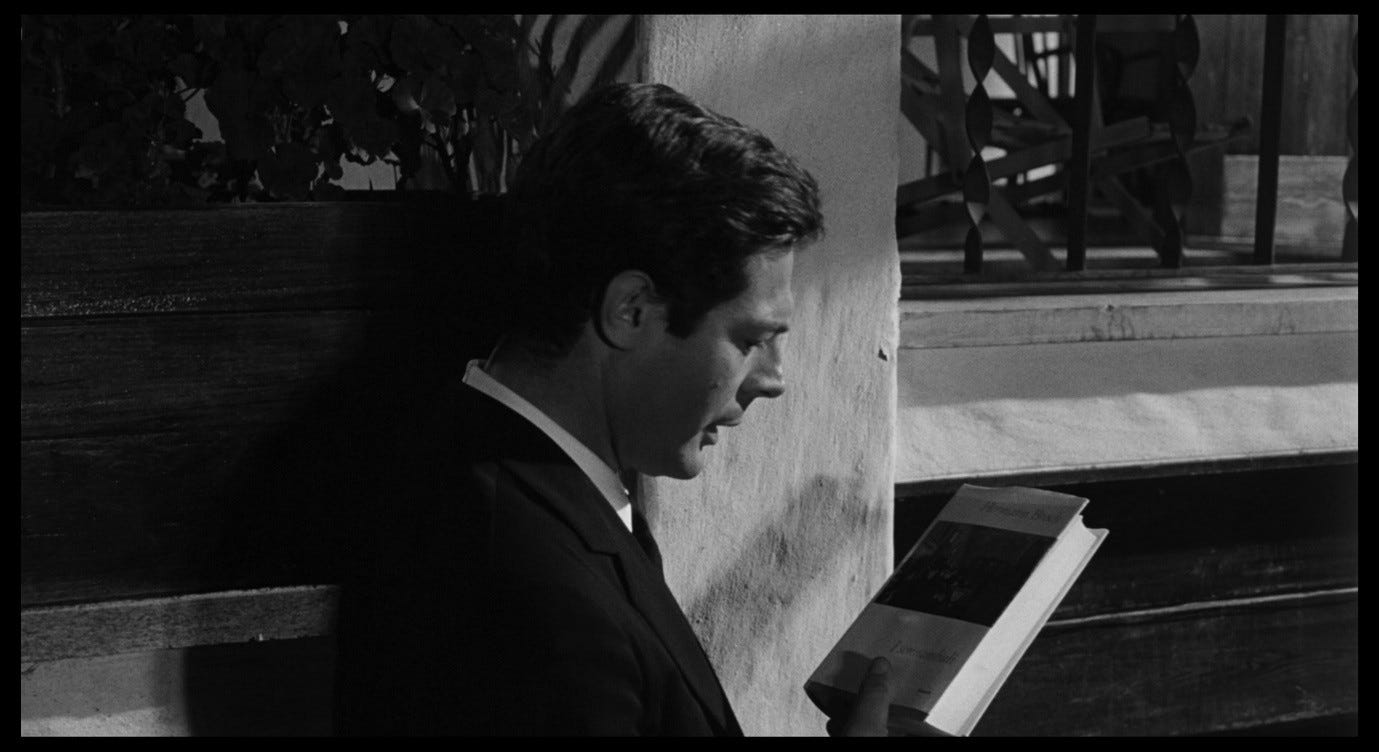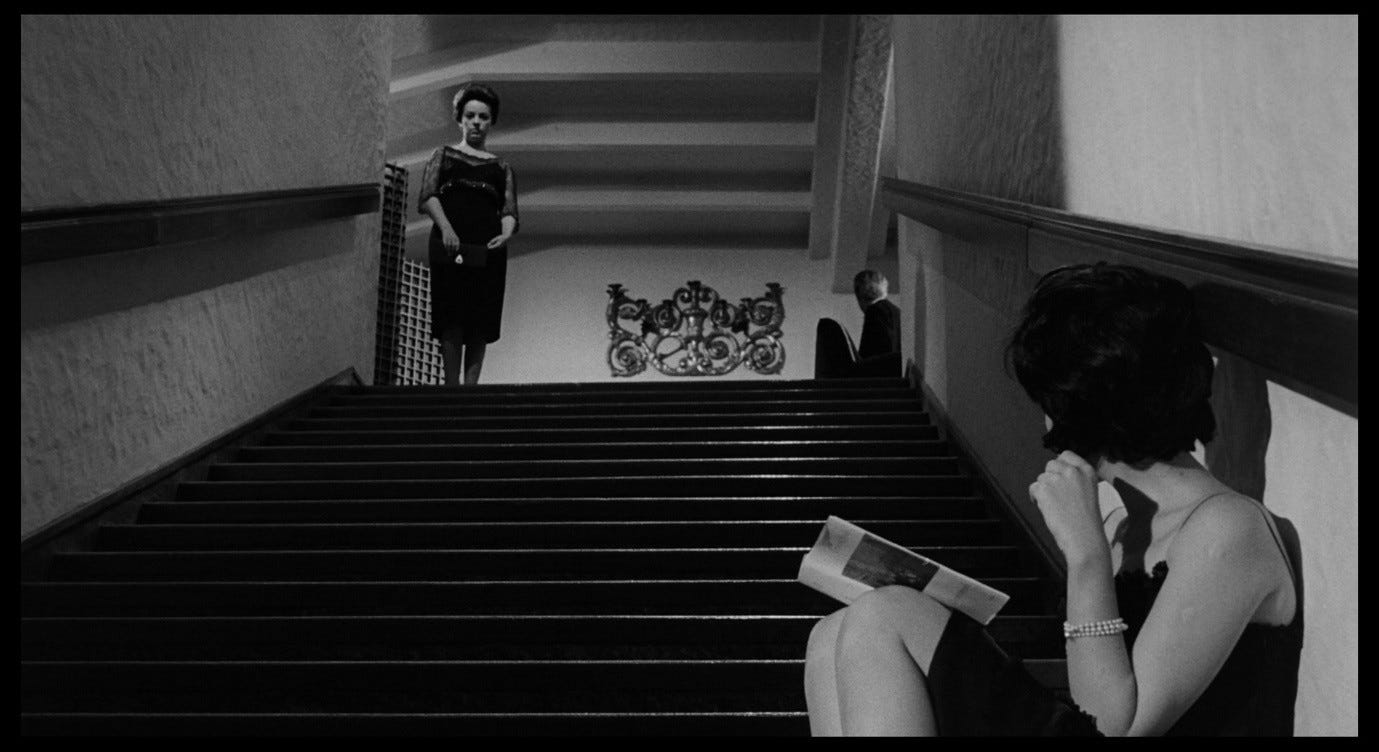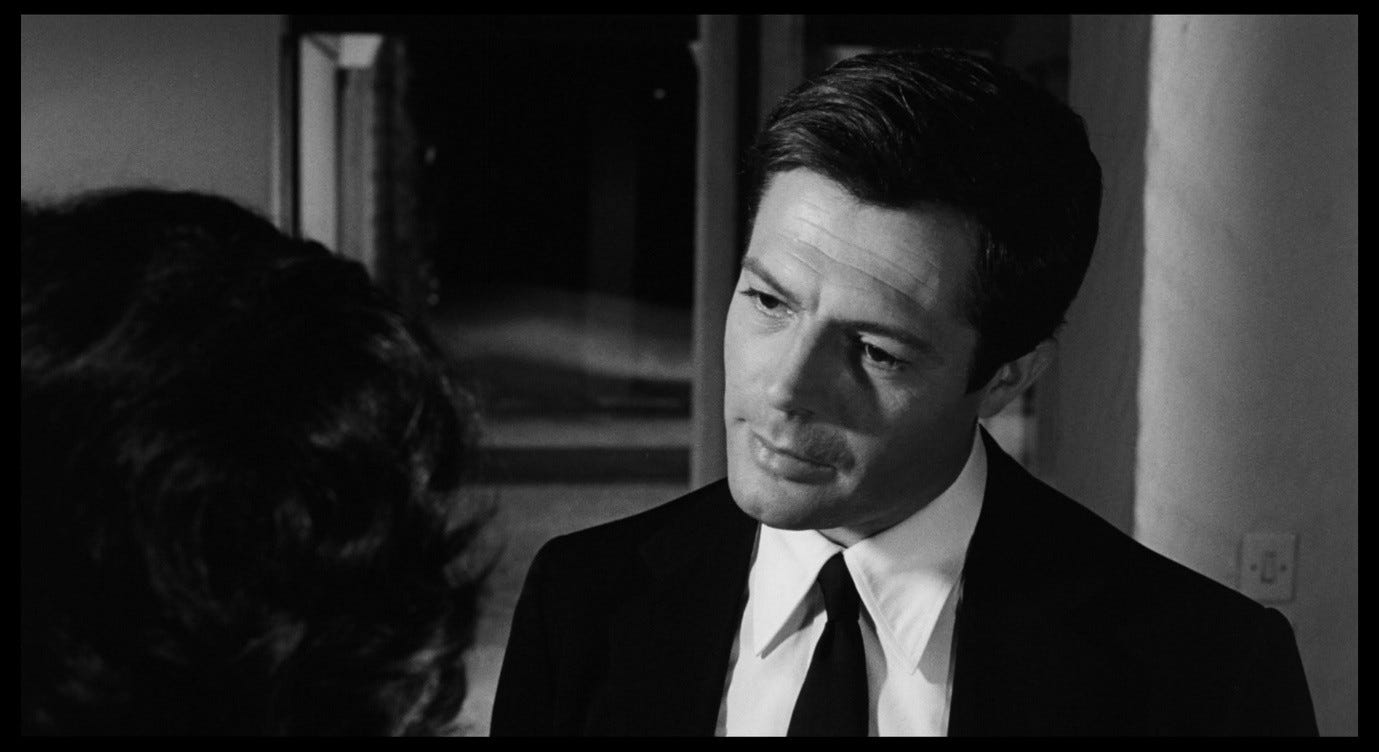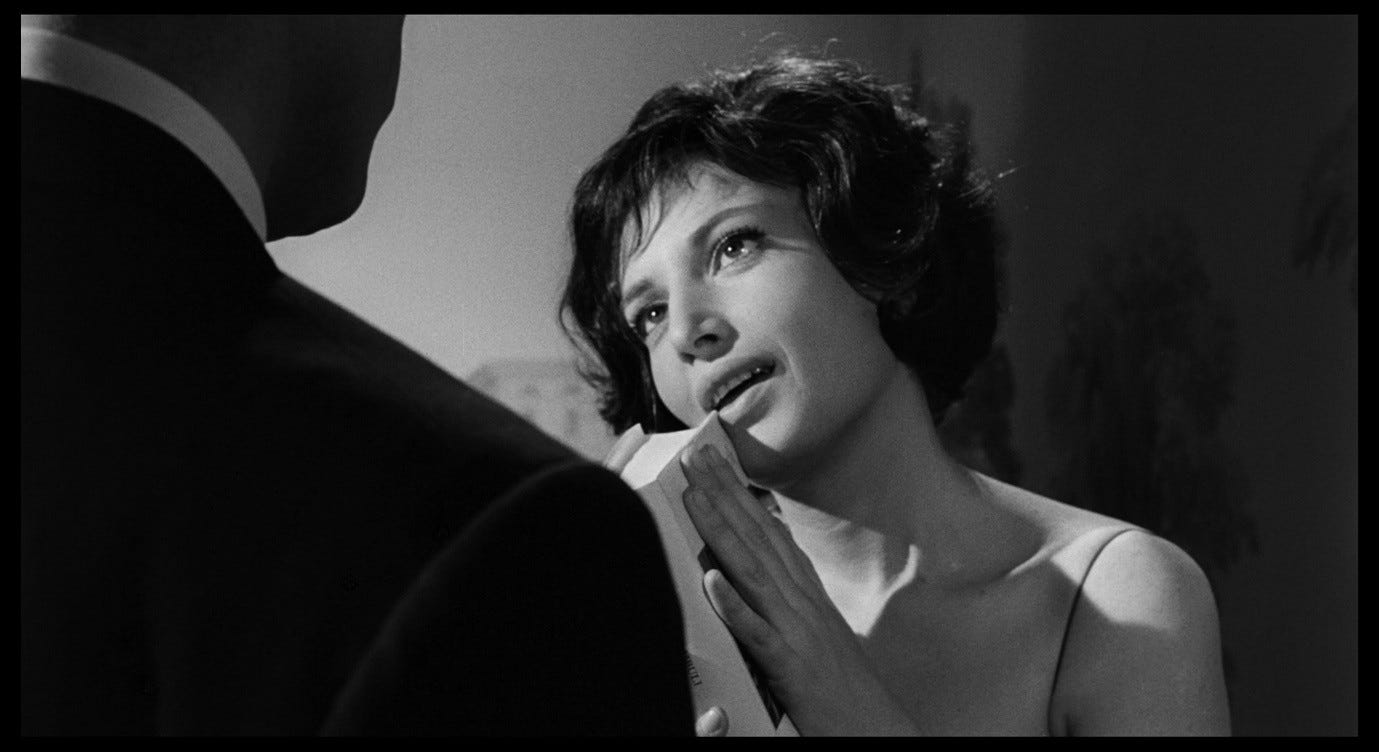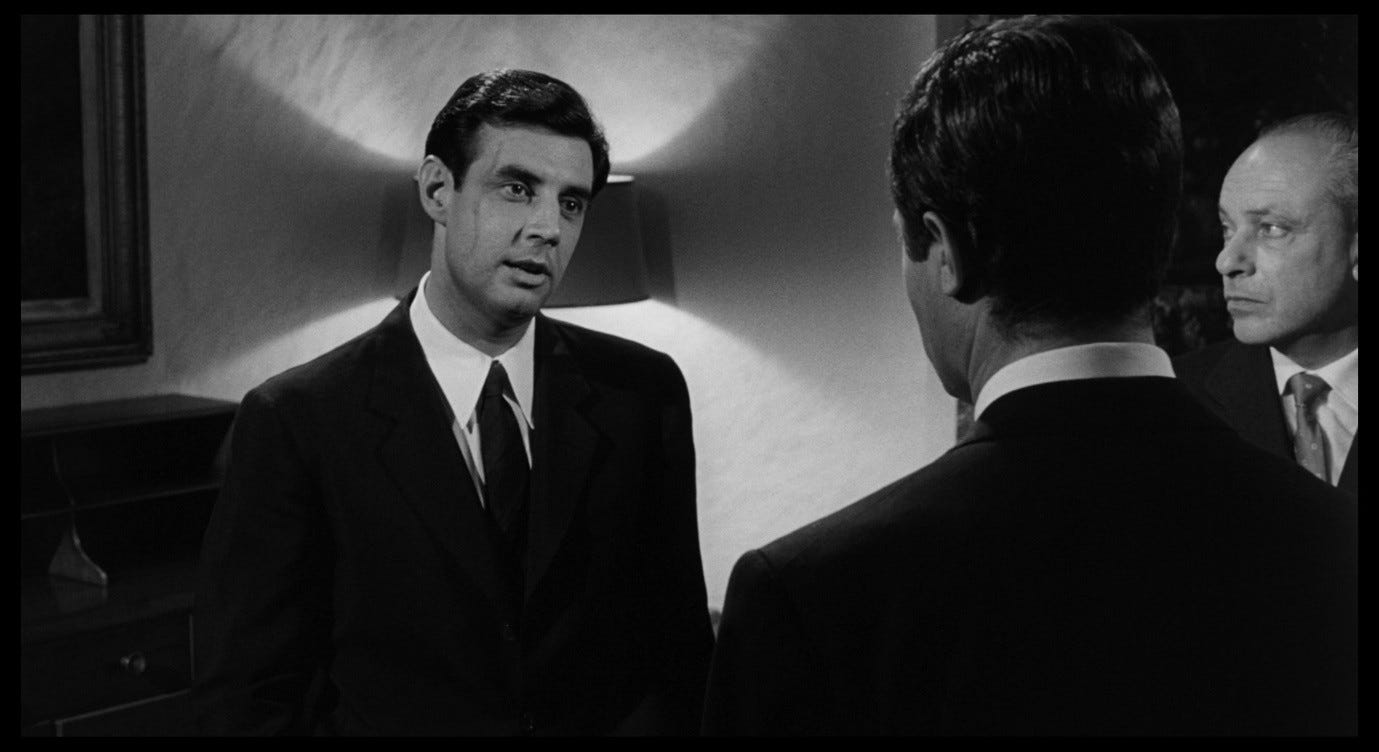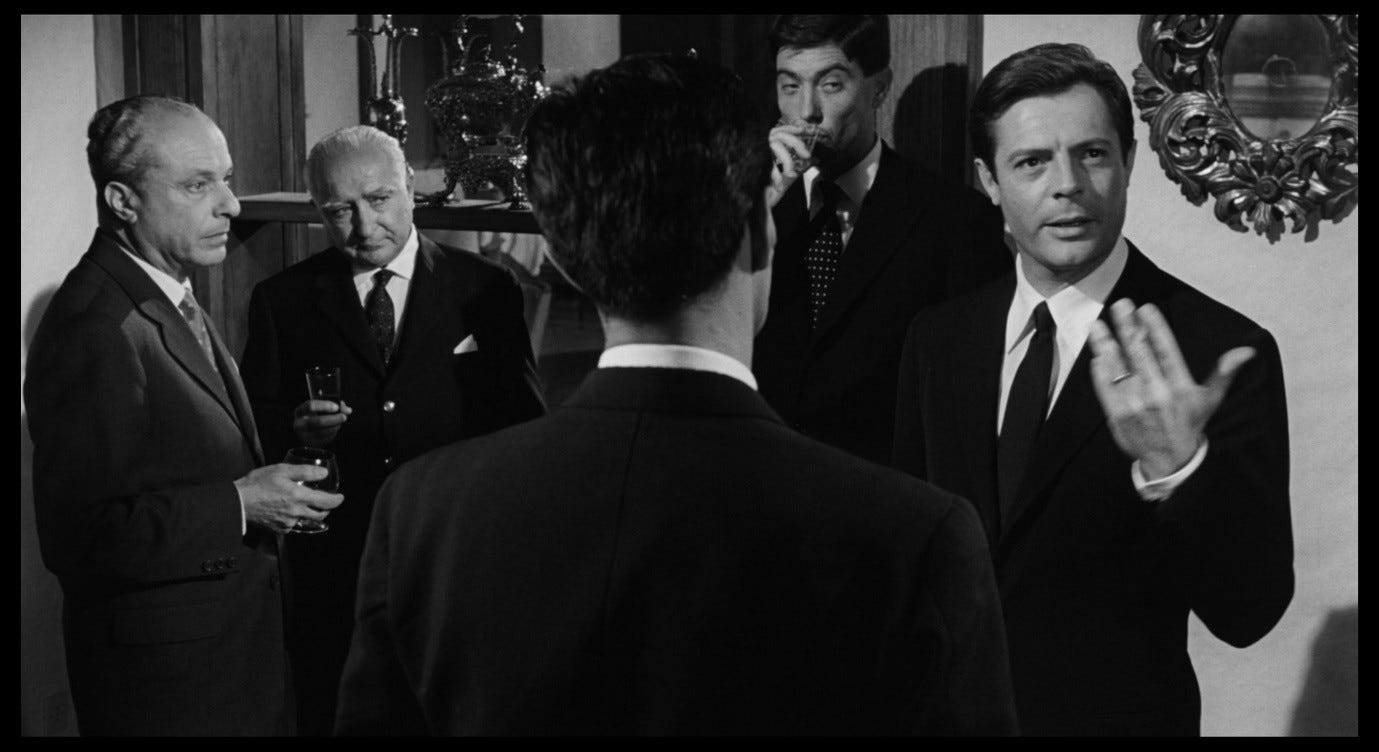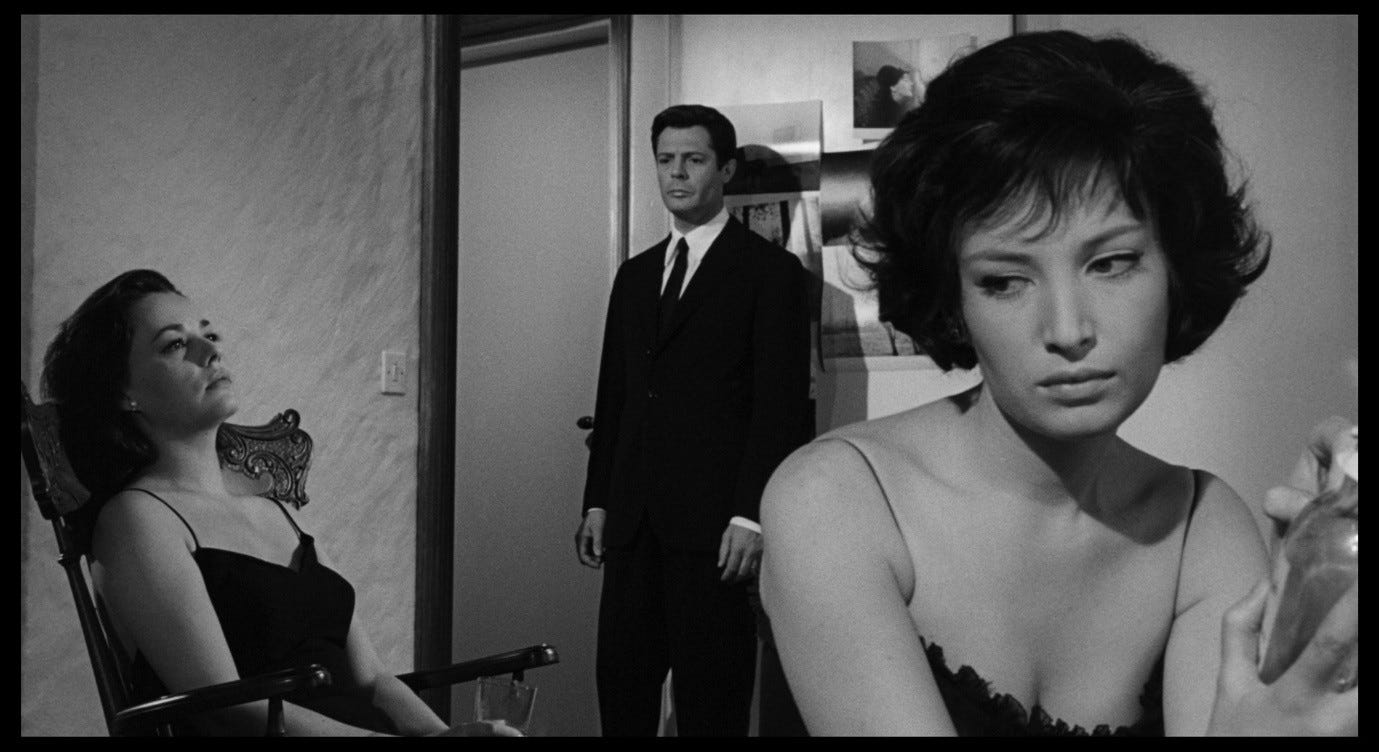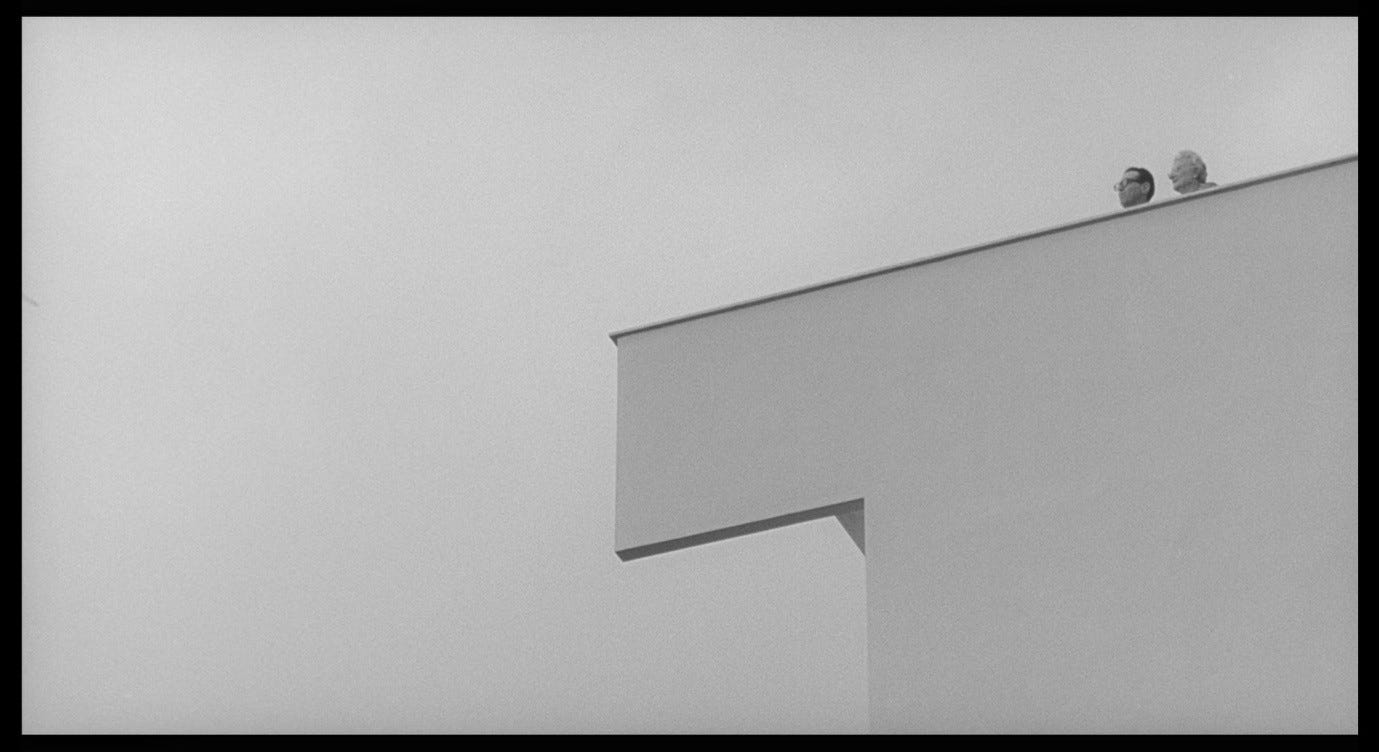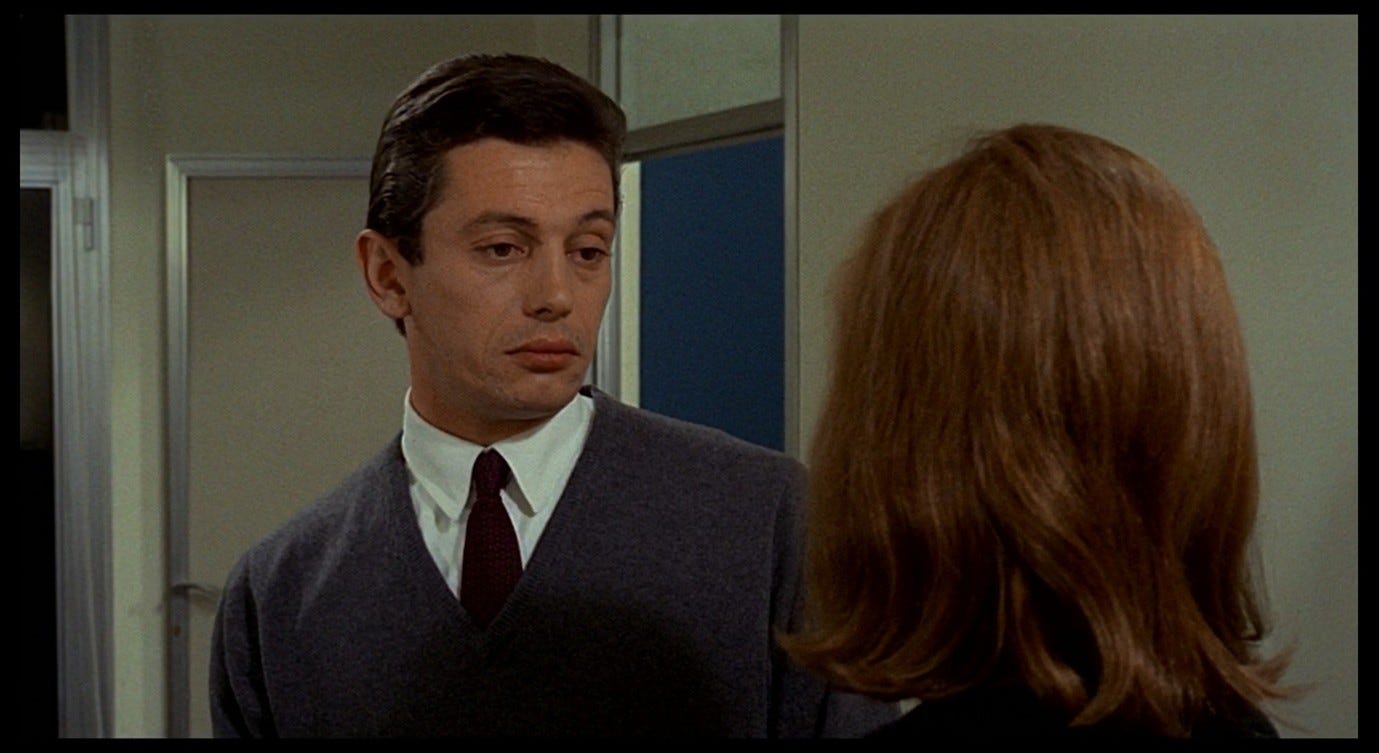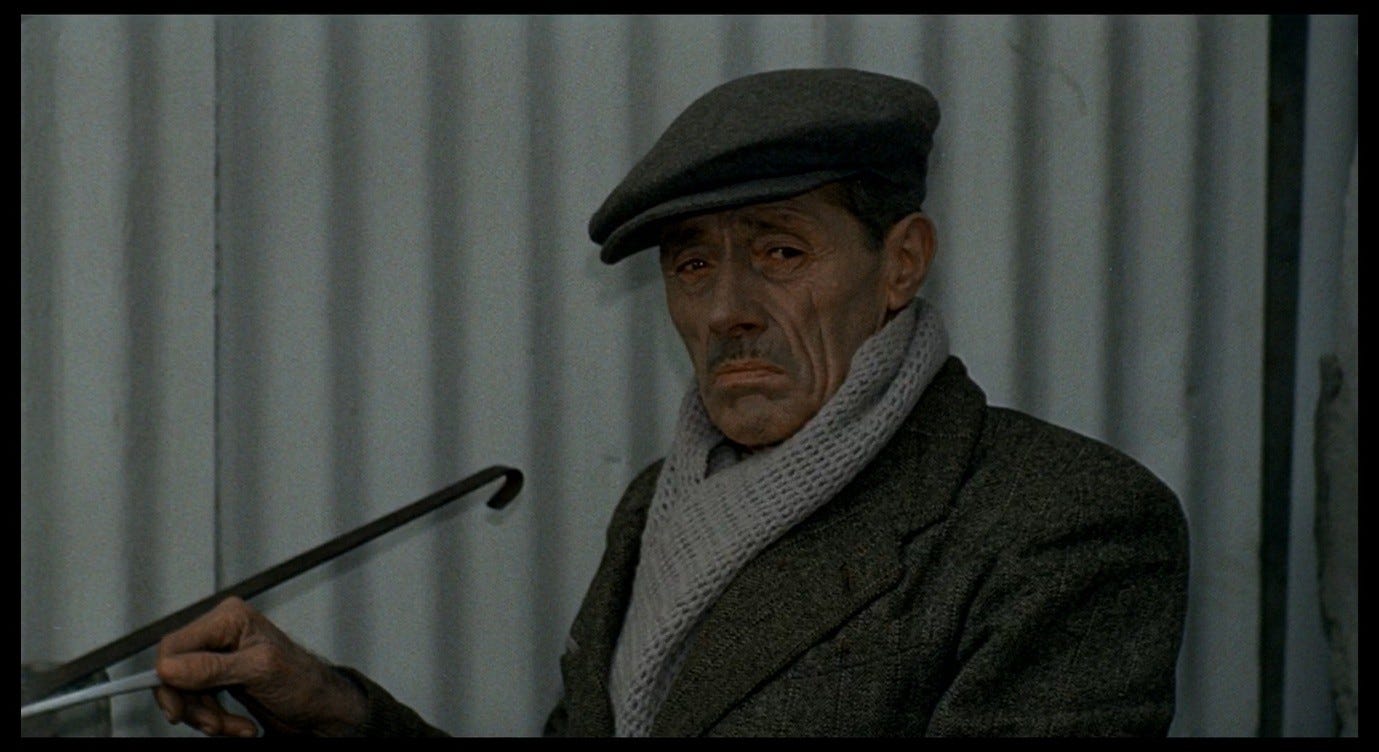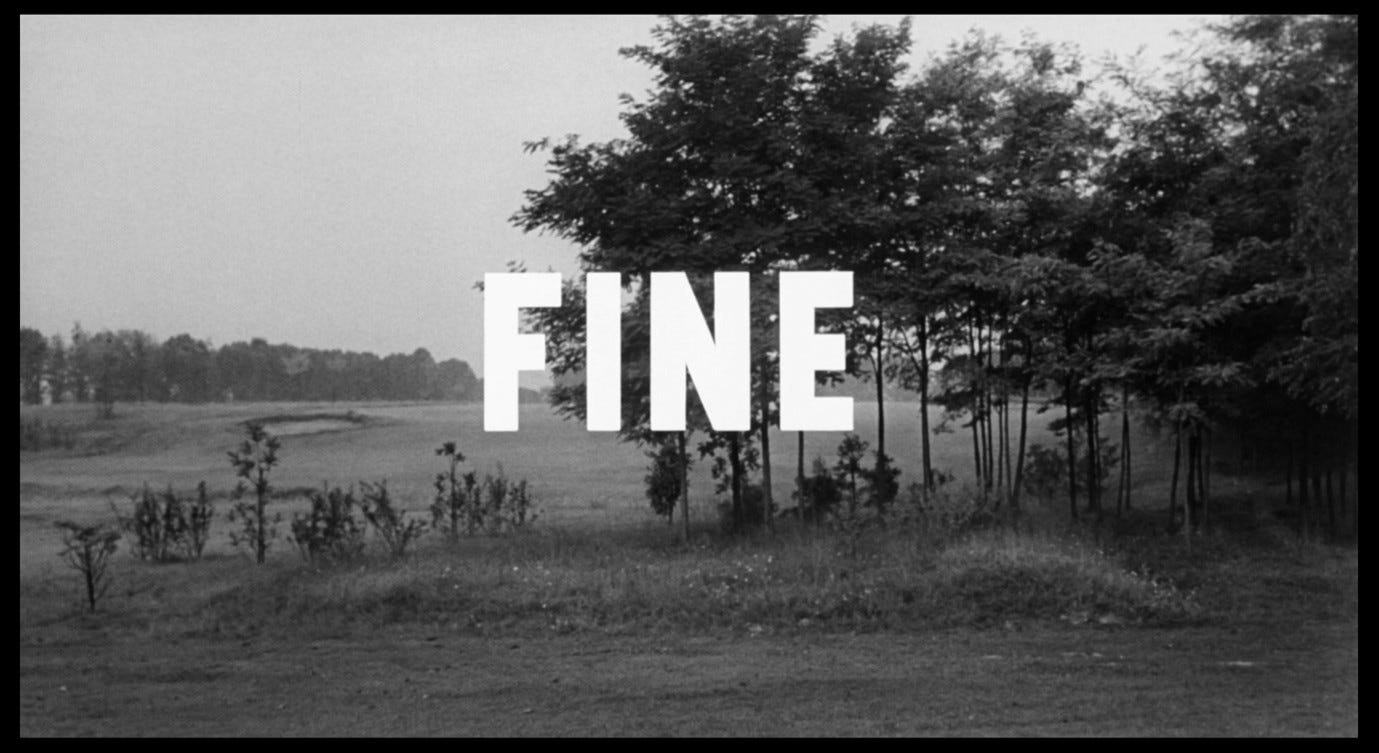Everything That Happens in Red Desert (30)
The disintegration of values
‘Who would be reading The Sleepwalkers here?’ asks Giovanni in La notte, finding a copy of Hermann Broch’s novel at the Gherardinis’ mansion.
It turns out to be a significant question: Giovanni, a writer of high-minded literary fiction, looks down his nose at the presumably un-cultured industrialists and their friends, but in fact it is Valentina Gherardini (who lives ‘here’) who is reading The Sleepwalkers.
By the end of the film, Giovanni seems close to accepting a lucrative job in the Gherardini corporation, reversing the trajectory of Hermann Broch who gave up a career in the textile industry and devoted himself to writing books that would benefit humanity. The Sleepwalkers is thus used as a focal point for an exploration of values. It is a challenging modernist masterpiece, too good to be lying around in the home of an industrialist; and yet Giovanni himself might become a fixture of this same home. He values Broch more highly than himself; Broch stands for principles that he would glumly allow to disintegrate around (and inside) him.
There is a sexual component to this value-oriented conflict, because after expressing an interest in ‘who here would be reading The Sleepwalkers,’ Giovanni ends up sleeping with this same reader. Valentina’s frivolous behaviour at the party prompts him to express disappointment, to which she responds ironically, holding up her copy of Broch’s novel, ‘How can I fix that – shall we read a few pages together?’ Giovanni responds, ‘That would be one way to get closer,’ implying that he would prefer another way.
The idea that the reader of The Sleepwalkers should be above frivolity is used, by Giovanni, as a kind of ‘negging’ pick-up line, but Valentina sees through this immediately: she knows perfectly well that this man is not interested in reading a novel with her. Meanwhile, Giovanni’s wife, Lidia, is almost-cheating on him with Roberto, leading to a tense confrontation between the two men. In the middle of a conversation about intellectuals selling out their principles to get rich, Roberto quotes this passage (with minor alterations) from Robert Musil’s The Man Without Qualities:
We are living in an unphilosophical, dispirited age; it doesn’t have the courage to decide what is valuable and what isn’t, and democracy means, expressed most succinctly: Do whatever is happening!1
Giovanni responds combatively:
I know those words – they are by a writer I love – but said here [qui], they horrify me a little. […] This man here [qui] said it with a certain complacency [compiacimento], while the author wrote it in despair.
Another party guest retorts that ‘What counts [conta] is what one says, not the intention.’ That is, the value of a statement – what it counts for – has no necessary relationship with its meaning. For Giovanni, it is the context of the statement that matters: it is offensive for this man here to say these words here (Giovanni gestures dismissively at his surroundings; in the background another guest narrows his eyes at him while sipping his drink) because Musil’s profound despair should not be cited amongst the amusing, complacent banter of a party.
But Roberto cited the passage as a deliberate dig at Giovanni, pointing out (perhaps having learnt or inferred this from his time with Lidia) that this self-righteous intellectual has no real philosophy, no integrity when it comes to ‘what is valuable and what isn’t.’ It must be a surprise to Giovanni that this party for rich fools contains not only a reader of Broch but also a reader of Musil, and the ‘horror’ he feels in this moment is less a justified rebuke of Roberto than a defensive gesture against Roberto’s justified rebuke. The word compiacimento contains the idea of piacere, hinting at the sexual threat that Roberto represents having just spent a portion of the evening alone with Lidia. Giovanni cannot live up to the high standards he pretends to admire in great authors, he cannot appreciate the value of his own wife, and he cannot make her happy – Lidia is most troubled by her lack of jealousy on discovering that she has been cheated on. Values, in the sense of artistic worth, moral principles, and mutual regard in interpersonal relationships, are all disintegrating at once.
The Sleepwalkers (like Tender is the Night or The Watcher) is exactly the kind of book you would expect an Antonioni character to be reading. Broch’s central theme in this novel is the disintegration of values in the modern world, which he sees manifested in various symptoms: in the state of modern architecture, in the horrors of mechanised warfare, in people’s increasingly mechanistic attitudes to life and to each other, and in the loneliness and alienation experienced by the novel’s characters. In this and the following two posts, I will discuss the relationship between The Sleepwalkers and Antonioni’s films, and will ultimately (in Part 32) use Broch’s portrayal of childhood as a way into understanding Red Desert’s most childhood-centric sequence.
The Sleepwalkers is punctuated by discursive interludes in which the narrator philosophises about his era – Broch was writing in the early 1930s – and attempts to diagnose its problems. For example, the narrator declares that ‘nothing is of more importance to any epoch than its style,’2 and insists also on the importance of ‘ornament’ in an epoch’s architectural style. This relates in a complex way to a very Antonioni-esque brand of existential dread:
Perhaps it would be idle to consider this too curiously if behind it there did not stand the problem which alone justifies all philosophizing: our dread of nothingness, our dread of Time, which conducts us to death. And perhaps all the disquietude which bad architecture evokes, causing me to hide in my house, is nothing else than that dread. For whatever a man may do, he does it in order to annihilate Time, in order to revoke it, and that revocation is called Space. [...] And in this also can be seen the peculiar symptomatic significance of ornament. For ornament, detached from all purposive activity, although produced by it, becomes the abstract expression, the ‘formula’ of the whole complex of spatial thought, becomes the formula of style itself, and with that the formula of the entire epoch and its life. And in this, it seems to me, lies the significance, a significance that I might almost call magical, of the fact that an epoch which is completely under the dominion of death and hell must live in a style that can no longer give birth to ornament.3
Through ornament, and through style, an epoch’s art and architecture help to stave off the ‘dread of nothingness’ the ‘dread of Time, which conducts us to death.’ The lack of ornament in modern architecture is symptomatic of the epoch’s lack of values, its subjugation to ‘death and hell,’ its proximity to the state of ‘nothingness.’
Giuliana’s anxieties in Red Desert (and those of many other Antonioni protagonists) are to a large degree rooted in a fear of change, or of transience. The world changes around us, we change within it (but in different ways), and our relationships themselves – to people and objects – are frighteningly changeable, even disposable. Like Broch, Antonioni is fascinated by architecture, and there is perhaps a link between Broch’s fear of ornament-less buildings and the famous images of brutalist architecture in the final sequence of L’eclisse: Piero and Vittoria suddenly disappear, their relationship disintegrates, and we are left with these plain, hard-angled shapes standing in isolation against the sky, with anonymous human figures poking out of them. ‘This is modern life, this is a prison,’ said the wagoner in Borom Sarret, looking at these kinds of buildings in the affluent centre of Dakar (see Part 25).
Broch goes on to ask, ‘in how far is the style of an age incarnated in the average man, in a business man, for example[?],’4 and this too is a question Antonioni frequently asks in relation to his male characters. Seymour Chatman describes Ugo as
the engineering version of the efficient man, cool and unflappable among his dynamos and steam boilers. And he is passing on to his son his calm if slightly deadly curiosity. Men like Ugo not only understand but come to resemble the gyroscope that can keep even the largest ship stable in the worst of storms. But when it comes to understanding what makes people tick, Ugo is reduced to speechlessness.5
That last comment is, I think, more true of Corrado, as we will see towards the end of this series. Ugo is not reduced to speechlessness, and his cold responses to Giuliana are not in contrast to his gyroscopic stability. He is fully himself and self-possessed in these moments, without any of the ‘ornament’ of unnecessary emotional displays. As far as he is concerned, he knows ‘what makes people tick,’ and Giuliana should follow the most simple and obvious steps to keep herself in gear.
For Broch, the lack of ornamentation in modern architecture finds its counterpart in the businessman’s ‘singleness of purpose’:
He organizes his day with singleness of purpose, he carries on his business affairs with his eye singly on his purpose, he evolves and concludes his contracts with his eye singly on his purpose. Behind all his purposefulness there lies a logic that is completely stripped of ornament, and the fact that this logic should demand the elimination of all ornament does not seem a too daring conclusion to draw; indeed it actually appears as good and just as every other necessary conclusion. And yet this elimination of all ornament involves nothingness, involves death, and a monstrous dissolution is concealed behind it in which our age is crumbling away.6
All activities, from war to art to politics to business, are conducted with
that ruthless logic directed on the object and on the object alone, which looks neither to the right nor to the left; and this, all this, is the style of thinking that characterizes our age. One cannot escape from this brutal and aggressive logic that exhibits itself in all the values and non-values of our age.7
This ‘singleness of purpose,’ this relentless logic and rigour, resemble the highly instrumentalised value-system that dominates Giuliana’s world, in which every person and object is seen in terms of their function. In Part 19, we heard Max expressing his philosophy, ‘Buy and sell quickly, go, go!’, and saw how this spilled over into his treatment of human beings. As Karl Schoonover puts it:
What does it mean to live in a world so unmagical that every single thing (animate or inanimate) must parade its utility? Would a world rich with only necessary objects be anything other than tyranny? In his explorations of excess and waste, Antonioni makes the costs of such a tyrannical world clear. […] If we can see the world as something more than just needs, we will once again see the world as humans see it.8
To buy and sell quickly, as Max does, implies that every purchasable thing has a limited and transient value, that it is possessed only to be sold in order to possess more things (and so on). The exploitative industrialist who is also a sexual predator is a good example of the ‘tyranny’ Schoonover refers to, but I think Antonioni’s take on this issue is more complex than urging us to ‘see the world as something more than just needs, as humans see it.’ Max’s and Ugo’s way of seeing is how humans see now, and those unnecessary-therefore-wasted by-products (animate or inanimate) may be regarded as victims of a tyranny that Antonioni, like Broch though for different reasons, sees as essential to the progression of humanity.
One result of the modern era’s ‘brutal and aggressive logic,’ Broch argues, is callousness and indifference towards suffering. He draws on the example of World War 1, framing the insanity of this conflict in terms that anticipate Catch-22:
How could a man take a gun in his hand, how could he march into the trenches, either to die in them or to come out again and take up his work as usual, without going insane? How is such adaptability possible? [...] Are [these men] insane because they did not go insane? Is it to be referred to a mere indifference to others’ sufferings? [...] The contradiction is not one between supporters and opponents of war, nor is it a horizontal split in the life of the individual [...] it is a split in the totality of life and experience, a split that goes much deeper than a mere opposition of individuals, a split that cuts right into the individual himself and into his integral reality.9
The question, ‘How is such adaptability possible?’, and the idea of a ‘split’ in the integral reality of an individual, recall Claudia’s horror in L’avventura at her own and Sandro’s capacity for radical transformation within moments of Anna’s disappearance. She agonises over this while the world rushes by at an insane speed outside the train window.
How can they be so indifferent to the unknown fate of someone they loved? How can Giovanni, in La notte, not even register the disintegration of his relationship with Lidia? How can Piero, in L’eclisse, not be as disturbed as Vittoria by the hollowness of a life that operates entirely through gestures and poses? And how can pretty much everyone in Red Desert carry on living as normal when the world is disintegrating all around them?
Surrounded by such perversely stable-minded people, Giuliana appears sane because she has been driven insane. As I noted in Parts 10 and 11, she resembles Hanna Wendling in The Sleepwalkers:
[P]erhaps [...] the increasing paralysis that gripped Hanna Wendling as the war progressed in severity was nothing but the expression of a highly moral revulsion from the horror to which mankind saw itself committed. And perhaps that revulsion, that horror, had already grown so strong in her that Hanna Wendling herself did not dare to be aware of it.10
Just as Giuliana is often spoken of – by Antonioni and by critics – as ‘neurotic,’ so Hanna Wendling suffers from ‘nervousness,’ but in both cases the condition goes deeper than the common terminology would suggest:
The external symptoms of this condition could best be covered by the popular term ‘nervousness,’ in so far as that implies the exhausting guerrilla warfare which during every second of its existence the ego has to wage against even the minutest encroachments of the empirical world with which its surface comes into contact. But although this term might account for much in Hanna Wendling, the peculiar tension in her life did not arise from nervous impatience with chance annoyances [...] [It arose from] the discrepancy between this infinitely modulated surface and the still, immovable profundity of her soul, which like the bottom of the sea was extended at a depth which no eye could ever penetrate.11
In Broch’s conception, the modern disintegration of values impacts people in different ways. Many simply adapt to the context they find themselves in, but some find themselves in conflict with it. The thing that conflicts with the modern age’s ‘singleness of purpose’ is often figured in terms of the infinite and diffuse: Hanna Wendling’s agonised sense of the discrepancy between the ‘empirical world’ and the ‘immovable profundity of her soul’ finds an echo in Giuliana’s equally agonised identification with the boundless ocean (see Part 22). Hanna’s soul extends, like the bottom of the sea, to a ‘depth which no eye could ever penetrate’; Giuliana’s eyes cannot look at the sea for too long without being penetrated and absorbed by it, and she is terrified at the mere thought of the creatures that might inhabit the sea depths; she has nightmares about sinking ‘down, down.’ As with Giuliana’s desire to ‘have everything’ and ‘love everything’ at once, Hanna’s contact with the infinite and the diffuse is also evidence of a connection with something important that is being lost in the modern age.
The Sleepwalkers uses the metaphor of the infinite ocean to draw a distinction between real and mistaken forms of ‘love.’ A man on a ship, far out to sea, escapes from the goal-oriented and mechanistic ethos of the world back on shore, and ‘seeks love’ in what Broch sees as its true sense:
[T]he passenger on board ship has no aim, and can never complete his destiny; he is closed within himself. All his potentialities lie asleep. One who loves him can love him only for what he promises to be, for all that lies within him, not for what he will achieve or has achieved; he will never achieve it. So men on shore know nothing about love and mistake their fears for love. The sea-passenger, however, soon comes to this knowledge, and the threads that were spun from him to those on shore are broken before the coastline sinks out of sight. [...] The eye of the passenger at sea is a different eye: it is the eye of an orphaned man that recognizes us no longer. [...] But if a distant coastline should come into sight he refuses to look at it and perhaps takes refuge in the belly of the ship until it has vanished again, for he knows that it is not love that awaits him there, not loose-footed freedom, but taut anxiety and the straight walls of his aim. For he who seeks love seeks the sea; he may perhaps speak of the land that lies beyond the sea, but he does not mean what he says, for he thinks of the voyage as endless, the voyage that nourishes in his lonely soul the hope of expanding and opening itself to receive that other who emerges free as air from the light haze and enters into him, that other whom he rightly recognizes as a potential, unborn immortal.12
Whereas Giuliana’s doctors try to teach her ‘how to love’ by getting her to love discrete and single objects, Broch would counsel the opposite: for him, that kind of love is merely ‘taut anxiety’ and ‘the straight walls of one’s aim.’ Love in its true form is expansive, open, and receptive, a way of connecting to something ‘potential’ and therefore infinite. Part of this idea survives in Antonioni, but divested of Broch’s religious overtones and rhapsodic style. Antonioni’s characters sometimes show this impulse to escape into the infinite, or into a communal and diffuse form of ‘free love.’ As we have seen, these impulses tend to fizzle out and come to nothing, but there remains a haunting sense of the ‘potential, unborn immortal’ out there in the cosmos, or behind the next layer of reality, waiting to be discovered.
Broch often refers to the disintegration of values, in his epoch, as a descent towards ‘absolute zero,’ but there seems to be an ambiguous relationship between this state of annihilation and the transcendent state of infinite potentiality. Towards the end of the novel, Broch speculates that the current disintegration of values may be a necessary stage in the transition to a new and better world:
[T]he transition from any value-system to a new one must pass through that zero-point of atomic dissolution, must take its way through a generation destitute of any connection with either the old or the new system, a generation whose very detachment, whose almost insane indifference to the suffering of others, whose stark denudation of values provides an ethical and so an historical justification for the ruthless rejection in times of revolution of all that is humane. And perhaps it must be so, since only such a silent and self-contained generation is able to endure the sight of the Absolute and the rising glare of freedom, the light that flares out over the deepest darkness, and only over the deepest darkness: the earthly reflection of the Absolute is like an image in a dark pool, and the earthly echo of its silence is the iron clangour of murder, which yet sends mute vibrations rolling like an impenetrable wall of deafening silence between man and man, so that no voice can rise beyond it or through it, and man must tremble.13
In Red Desert, Antonioni shows a similarly ambiguous attitude towards the nihilism of the industrialised world he is exploring. On the one hand, it is terrifying to feel so outdated and left behind by the advances of the mid-20th-century, but on the other hand there is something beautiful about the new world that is destroying the old. Perhaps Broch’s use of the term ‘absolute zero’ was in Flavio Niccolini’s mind when he talked about the old man Tanino’s performance as the fruit-vendor in the Via Alighieri:
At the cut, Monica turns around, says to us: ‘he’s frightening.’ Maybe this is what Tanino wants: to frighten, for the last time, before disappearing into the absolute zero, in the physical and spiritual starvation of the old folks’ home in via Roma. Antonioni turns to me smiling, satisfied and sly: I’m sure that between him and Tanino there’s a secret and reciprocal creative satisfaction, a shared sense of the tragic revelation of truth.14
In this anecdote, Antonioni seems to identify with Tanino, to share his ‘tragic revelation’ about encroaching starvation and dissolution – and he seems to share both the joy and the terror of this revelation, which are closely intertwined. The moment of contact with oblivion is also a generative moment, a creative act that brings ‘truth’ to light via (as Broch might say) ‘the deepest darkness.’ Antonioni expressed something like Broch’s optimism in interviews, when he talked about the amazing new world that future generations would live in, but in his films the accent is more on the tragic aspect of these revelations. La notte is a good example: in its title is inscribed the darkness from which Broch would imagine a flare of hope springing, and Giovanni certainly represents something like that ‘insane indifference’ and ‘stark denudation of values’ that Broch saw as a harbinger of revolution and renewal. But the conclusion of La notte brings us out of the literal night only to leave us in the depressing grey dawn of that final scene between Giovanni and Lidia.
‘I don’t love you anymore!’ she cries out; ‘And you don’t love me either – say it!’ ‘Be quiet,’ he responds. This moment is haunted by that earlier comment at the party, ‘What counts is what one says, not the intention.’ Giovanni now seems to agree. It does not matter if he and Lidia do not love each other, as long as they do not say it out loud. In raping her, Giovanni commits fully to the mindset that Roberto satirised in his quotation from Musil: lacking the courage to distinguish between what has value and what does not, what is love and what is no-longer-love, his relationship to Lidia becomes purely tyrannical and abusive. The way in which the disintegration of values manifests on an interpersonal level is a central concern for both Broch and Antonioni, and the distinctions in how they approach this theme will prove illuminating as we explore the latter part of Red Desert.
Next: Part 31, Alienation and loneliness.
View the Contents post to browse the full series.
Follow me on BlueSky and/or Twitter.
Musil, Robert, The Man Without Qualities (1930-1943), trans. Sophie Wilkins (Basingstoke: Pan Macmillan, 2017), p. 1195
Broch, Hermann, The Sleepwalkers (1930-1932), trans. Willa and Edwin Muir (New York: Vintage Books, 1996), Kindle edition, loc. 7017
Broch, Hermann, The Sleepwalkers (1930-1932), trans. Willa and Edwin Muir (New York: Vintage Books, 1996), Kindle edition, loc. 7172-81
Broch, Hermann, The Sleepwalkers (1930-1932), trans. Willa and Edwin Muir (New York: Vintage Books, 1996), Kindle edition, loc. 7480
Chatman, Seymour, Antonioni, or, The Surface of the World (Berkeley: University of California Press, 1985), p. 85
Broch, Hermann, The Sleepwalkers (1930-1932), trans. Willa and Edwin Muir (New York: Vintage Books, 1996), Kindle edition, loc. 7514
Broch, Hermann, The Sleepwalkers (1930-1932), trans. Willa and Edwin Muir (New York: Vintage Books, 1996), Kindle edition, loc. 8076
Schoonover, Karl, ‘Antonioni’s Waste Management’, in Antonioni: Centenary Essays, ed. Laura Rascaroli and John David Rhodes (London: Palgrave Macmillan, 2011), pp. 235-53; p. 252
Broch, Hermann, The Sleepwalkers (1930-1932), trans. Willa and Edwin Muir (New York: Vintage Books, 1996), Kindle edition, loc. 6738-52
Broch, Hermann, The Sleepwalkers (1930-1932), trans. Willa and Edwin Muir (New York: Vintage Books, 1996), Kindle edition, loc. 6782
Broch, Hermann, The Sleepwalkers (1930-1932), trans. Willa and Edwin Muir (New York: Vintage Books, 1996), Kindle edition, loc. 6768-75
Broch, Hermann, The Sleepwalkers (1930-1932), trans. Willa and Edwin Muir (New York: Vintage Books, 1996), Kindle edition, loc. 3989-4008
Broch, Hermann, The Sleepwalkers (1930-1932), trans. Willa and Edwin Muir (New York: Vintage Books, 1996), Kindle edition, loc. 11878-83



